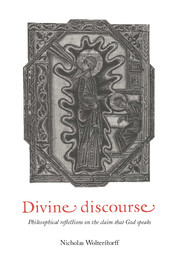Book contents
- Frontmatter
- Contents
- Preface
- 1 Locating our topic
- 2 Speaking is not revealing
- 3 The many modes of discourse
- 4 Divine discourse in the hands of theologians
- 5 What it is to speak
- 6 Could God have and acquire the rights and duties of a speaker?
- 7 Can God cause the events generative of discourse?
- 8 In defense of authorial-discourse interpretation: contra Ricoeur
- 9 In defense of authorial-discourse interpretation: contra Derrida
- 10 Performance interpretation
- 11 Interpreting the mediating human discourse: the first hermeneutic
- 12 Interpreting for the mediated divine discourse: the second hermeneutic
- 13 Has Scripture become a wax nose?
- 14 The illocutionary stance of biblical narrative
- 15 Are we entitled?
- 16 Historical and theological afterword
- Notes
- Index
13 - Has Scripture become a wax nose?
Published online by Cambridge University Press: 01 June 2011
- Frontmatter
- Contents
- Preface
- 1 Locating our topic
- 2 Speaking is not revealing
- 3 The many modes of discourse
- 4 Divine discourse in the hands of theologians
- 5 What it is to speak
- 6 Could God have and acquire the rights and duties of a speaker?
- 7 Can God cause the events generative of discourse?
- 8 In defense of authorial-discourse interpretation: contra Ricoeur
- 9 In defense of authorial-discourse interpretation: contra Derrida
- 10 Performance interpretation
- 11 Interpreting the mediating human discourse: the first hermeneutic
- 12 Interpreting for the mediated divine discourse: the second hermeneutic
- 13 Has Scripture become a wax nose?
- 14 The illocutionary stance of biblical narrative
- 15 Are we entitled?
- 16 Historical and theological afterword
- Notes
- Index
Summary
I have argued that authorial-discourse interpretation requires the use by the interpreter of convictions as to what the discourser is likely and unlikely to have wanted, and not wanted, to say. When the relevant convictions of this sort are lacking, interpretation is stymied or goes astray. Let me give an example.
In Mircea Eliade's fascinating book, The Myth of the Eternal Return, we find this paragraph:
During the course of the akitu ceremony, which lasted twelve days, the so-called epic of the Creation, Enûma elis, was solemnly recited several times in the temple of Marduk. Thus the combat between Marduk and the sea monster Tiamat was reactualized – the combat that had taken place in illo tempore and had put an end to chaos by the final victory of the god. Marduk creates the cosmos from the fragments of Tiamat's torn body and creates man from the blood of the demon Kingu, to whom Tiamat had entrusted the Tablets of Destiny … That this commemoration of the Creation was in effect a reactualization of the cosmogonic act is proved both by the rituals and by the formulas recited during the course of the ceremony. The combat between Tiamat and Marduk was mimed by a struggle between two groups of actors, a ceremonial that is also found among the Hittites (again in the frame of the dramatic scenario of the New Year), among the Egyptians, and at Ras Shamra. […]
- Type
- Chapter
- Information
- Divine DiscoursePhilosophical Reflections on the Claim that God Speaks, pp. 223 - 239Publisher: Cambridge University PressPrint publication year: 1995



